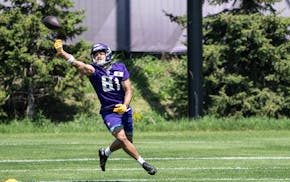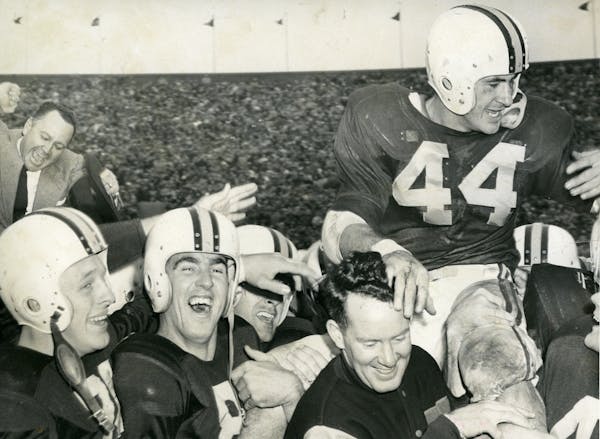Bob McNamara was an All-America football player at the University of Minnesota in the 1950s, but his influence at the school lasted decades.
He was presented with a ring when the Gophers golf team won the 2002 national title, his name is on an academic center for student-athletes and he was named an honorary football captain for the inaugural game at TCF Bank Stadium in 2009.
He was that special to his beloved Gophers' athletic program.
McNamara, a standout running back and one of the most important financial backers in the history of the school's athletic program, died Sunday night after a lengthy illness. He was 82.
"He basically went over and worked at the university in his retirement years," said Lou Nanne, who had been involved in many of the same projects with McNamara. "He was involved in whatever we needed. He worked tirelessly, on everything. He was great, just great. And he loved doing it."
McNamara was an energetic fundraiser for Gophers athletics, and had a large hand in raising money for many of the university's biggest athletic projects. After three Gophers sports — men's and women's golf and men's gymnastics — were designated for elimination in April 2002 because of athletic budget shortfalls, McNamara, Harvey Mackay and Nanne joined forces to spearhead a drive that saved the sports from the chopping block.
McNamara was also instrumental in raising money for construction of TCF Bank Stadium, the new Gophers baseball stadium that opened in 2013 and the Baseline Tennis Club.
Gophers baseball coach John Anderson marveled at McNamara's "unbelievable network of people … and I think his passion and love of the university rubbed off on others."
McNamara himself was not a wealthy man, running a bar/restaurant in northeast Minneapolis for much of his adult life. He often joked about his one big advantage in raising money: his younger brother, Richard "Pinky" McNamara, another former Gophers running back who became a highly successful businessman. Bob McNamara said on major projects that his younger brother was invariably "my first call."
But the reality was that Bob McNamara was dogged in supporting his beloved university, as much so as Pinky, who once gave the university $10 million.
The McNamara Academic Center, which is in the Bierman Field Athletic Building, is named after the brothers. Pinky died in 2011 after a lengthy struggle with Alzheimer's disease.
Bob McNamara's perseverance was never more evident than in the early 2000s, when he helped raise the $2.7 million needed to save men's and women's golf and men's gymnastics, then immediately turned his attention to raising funds for endowed scholarships that would stave off any future attempt at eliminating the sports.
"I've always been the kind of person where, when I start a project, I like to finish it," McNamara said at the time. "Saving a sport for three years really doesn't mean that much if it's still going to be in danger."
The Gophers men's golf team captured its first and only national title in 2002, shortly after McNamara had begun his effort to save the program. After winning the title, then-Gophers coach Brad James presented McNamara with a national championship ring. A couple of years later, McNamara had helped endow 4½ men's golf scholarships.
"I feel a debt of gratitude to everyone, and I don't want to pinpoint anyone, but Bob McNamara is the one driving this engine," James said at the time. "The man is absolutely amazing.
"Because of what they've done, a lot of young Minnesota golfers out there can breathe a sigh of relief, because they know this team is going to be around. That question came up every time I went on a recruiting trip the last two years. Now, I can say, 'I'm glad you asked that … and tell them about people like Bob McNamara. That man is truly a Minnesota great."
Gophers Athletic Director Norwood Teague said in a statement Monday that the university "had no greater advocate than Bob McNamara. … From athletics to academics, his fingerprints are all over this campus, as he literally had an impact in everything that we do. There will never be another Bob McNamara and we thank him and his family for everything they have done for Minnesota."
The story of the McNamara brothers is a real-life Horatio Alger tale. They were two of six children raised in Hastings by their mother. Their father was an alcoholic and had little involvement with the family.
"My mother, Eva, was the breadwinner and the hero of our family," Bob once said.
Bob and Pinky were star athletes at Hastings, earning them athletic scholarships to Minnesota and a chance at a college education.
Bob was an All-Big Ten running back in 1952 and 1954; he shared the backfield with another All-America, Paul Giel, in 1952 and '53. After Giel left following the 1953 season, Bob was given a chance to excel, and he became a consensus first-team All-America.
Although drafted by the NFL Cleveland Browns, Bob chose to sign with the Winnipeg Blue Bombers and became an All-Star in the Canadian Football League. He played with the Denver Broncos in their inaugural American Football League season in 1960.
Bob and Pinky both said their devotion to the university could be traced to the role the school played in their lives. And they certainly returned the favor, and then some.
"You didn't have to ask Bob for help," Anderson said.
"He always came to you and wanted to help. He was inspirational because of how much he cared. He certainly impacted my life significantly, for all the right reasons."
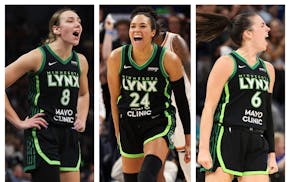
As Lynx 'run it back' this season, their bedrock is trio from the Class of '19
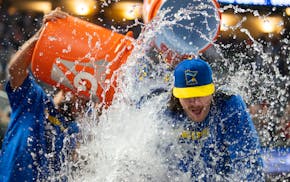
Paddack clings to perfection into the sixth inning, pitching the Twins past the Giants
Reusse: Twins play Giants, triggering Mays memories and a question: Can we get the Black players back?
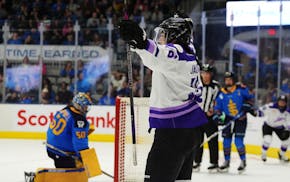
Frost turn away Toronto, even PWHL playoff series at a win apiece
